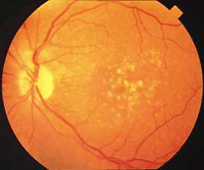Macular Degeneration (AMD)

The Macula is responsible for our central vision. Without it we would lose our ability to read, drive a car, recognize faces, and even color and details!
Types of AMD:
- Dry – This is the most common, early stage. At first, it can have no symptoms at all. Later on, there’s a decrease in vision, and can lead to Wet AMD.
- Wet – This is the most aggressive form associated with new vessel growth, and can lead to loss of vision.
Chances of developing AMD increase dramatically as we age. Although the specific causes for AMD are not known, there are several risk factors that research has identified, although many have been contraindicated. In other words, here’s what we think:
Risk Factors:
- Age – The longer you live, the greater your chances.
- Obesity & Inactivity – Overweight patients had twice the risk of developing Wet AMD. Vigorous activity 2-3 times per week was found to reduce this risk.
- Heredity & Genetics – Appear to be contributors.
- High Blood Pressure – Appears to be associated.
- Lighter Eye Color – It’s long been thought that darker pigment has a protective effect.
- Drug Side Effects – Drugs including Aralen (chloroquine), phenothiazine, chlorpromazine, Mellaril (thioridazine), Prolixin (fluphenazine), Trilafon (perphenazine), and Stelazine (trifluoperazine).
Treatment:
- Nutrition – Researchers believe that certain nutrients may help lower the risk for ARMD, or at least slow down the progression, and possibly avoid Wet AMD. In the Age-Related Eye Disease Study Phase I (AREDS-1) released in 2001 supported this. There are not, however, any FDA approved treatments for Dry AMD. They include:
-
- Zinc Oxide – AREDS-1 demonstrated that 80mg was beneficial, however, there was a 6% incidence of adverse effects. The national Eye Institute in 2006 announced that in AREDS-2 this would be reduced to 40mg daily.
- Carotenoids:
- Lutein – Leafy Greens (Kale, Spinach, Collards), Broccoli, Eggs
- Zeaxanthin – Corn, Spinach, Collards, Tangerines
- Vitamins A, C, & E
- Fish & Omega-3 Fatty Acids – AREDS-2 will include Omega-3’s
- PDT / Visudyne – FDA approved, Photodynamic Therapy has been shown to improve vision in some with Wet AMD, but they are a minority of cases and is a temporary solution.
- Lucentis – FDA approved, has been shown to stop, and in some cases reverse at least some vision loss.
- Avastin – Not FDA approved, however, many doctors are using it with similar results to Lucentis.
Summary:
The specific causes for AMD are still a mystery. Research, including AREDS-1 & 2 point towards fitness, exercise, and nutrition as proactive approaches that are at very least accessible to most us. There are many that believe that an emphasis on a healthy diet, no smoking of course, and moderate exercise may even prevent AMD. Others believe that the issue is simple genetics. Still, annual exams and early diagnosis with subsequent monitoring can help identify the imminent signs of wet AMD and lead to it’s early treatment, and abatement.
Note:
I personally am affected by dry AMD. My father had a very aggressive form of wet AMD that lead to loss of vision in one of his eyes at an early age. As it turns out, he was a smoker for most of his life and I do not smoke.
In my case, it’s possible that the condition was simply baked into my genes. My retinal specialist suggests that the catalyst was a drug side effect. In any case, I exercise, eat a balanced diet, and take AREDS approved supplements. The research is not always in agreement. So, one simply has to look at the evidence and go their own way, but by all means be proactive.
I take VisiVite Gold as well as Nordic Naturals Ultimate Omega. There are many good products on the market including I-Caps, Ocuvite. I don’t really think it matters which brand you take. Just get off the couch, trade in the burger for the salmon, and take a few vitamins. Have a thorough dilated exam every year, and eat dark chocolate — it didnt’ show up in the studies, but I’m certain it’s good for something.
References:
http://www.nei.nih.gov/amd/
http://www.nei.nih.gov/areds2/
http://www.macular.org/nutrition/zeaxan.html
http://www.allaboutvision.com/conditions/lucentis-vs-avastin.htm
http://maculardegenerationauthority.com/Drugs-Harmful-to-the-Eyes.html

